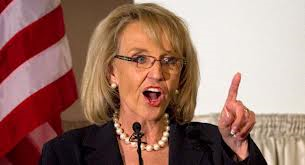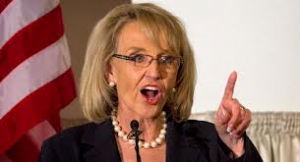Brewer Makes Less Than Most Governors

Cronkite News
WASHINGTON – Besides having one of the lowest governor’s salaries in the nation, Arizona Gov. Jan Brewer also makes less than almost all of the state’s top administrative officials, according to a recent report.
Brewer’s $95,000 annual salary was less than that of 44 other governors in 2013 and was topped by 37 Arizona administrators out of 44 included in an April survey by the Council of State Governments.
The top Arizona salaries in the report went to state officials who direct higher education and commerce departments, each of whom made $300,000, the survey said.
But governors across the country consistently make less than the bureaucrats who reported to them, according to the data, which came as no surprise to experts.
“We don’t pay our elected officials a lot. Period,” said Ruth Jones, a professor at the School of Politics and Global Studies at Arizona State University.
And the author of the survey said the salary is not why governors run for the office, either.
“You don’t want to be governor just to make a lot of money,” said Audrey Wall, the managing editor of the Council of State Governments. “That’s not what your goal is if you’re running for that office.”
Wall said there is no single reason why governors make such little money relative to administrators.
The recession played a big role. But while Wall said that states “are on the road to recovery,” governors’ salaries will not rebound as quickly as those in the private sector.
“States have a tendency sometimes to move a little slower,” she said.
Wall said many governors do not receive pay raises because citizens don’t want to see their governors receiving huge CEO salaries.
“Governors are even more closely linked to the electorate, to the people,” Wall said.
Among governors, Brewer made more than only those in Arkansas, Maine, Oregon, Colorado and Alabama in 2013.
Among top officials in her own state, Brewer’s salary was higher than only the secretary of state, treasurer, attorney general, and administrators in public library development, employment services and education.
A state administrator’s pay in Arizona should not be compared to a comparable bureaucrat in another state, Wall said, because the structure of the state governments might be different. The official overseeing border security in Arizona, for example, might have more responsibilities than an official with the same job in Nebraska. That could account for a difference in state administrators’ pay, she said.
But Jones said the governor’s salary should not be compared to state administrator salaries at all. They are two different types of jobs, she said: One is an elected office and many of the others, like the administrator for higher education, are not.
Jones noted that Brewer receives other perks with her job. Governors get free transportation and probably don’t have to pay for many meals, she said. The biggest perk is the power and influence that comes with being governor.
Jones said she knows many people who say the state should not be giving more money to the governor. State voters and legislators are weary of raising the governor’s pay, Jones said, adding that, “it’s not good politics to raise your own pay.”
Brewer’s office did not return calls seeking comment on the report.
Wall said it is hard to predict if Brewer’s pay will be raised anytime soon. A lot has to do with politics and whether or not it’s an election year.
With or without a raise, Jones said the state is getting its money’s worth from whomever is in the governor’s office.
“It’s a hard job. It’s not an easy job,” she said. “It isn’t paid with what the job demands.”
Salaries of top state officials in Arizona in 2013, according to a survey by the Council of State Governments. Job titles are those used by the council for its nationwide survey:
Commerce: $300,000 Higher education: $300,000 Social services: $173,250 Welfare: $173,250 Administration: $160,000 Corrections: $160,000 Fish and wildlife: $160,000 Revenue: $145,000 Budget: $140,000 Planning: $140,000 State police: $139,549 Health: $136,000 Consumer affairs: $135,000 Environmental protection: $135,000 Adjutant general: $134,000 Public utility regulation: $133,574 Natural resources: $131,500 Information services: $131,387 Transportation: $130,000 Auditor: $128,785 Highways: $128,700 Labor: $126,069 Personnel: $125,000 Civil Rights: $123,651 Parks and recreation: $122,200 Banking: $119,000 Comptroller: $117,702 General services: $116,000 Purchasing: $116,000 Insurance: $115,650 Mental health: $109,037 Tourism: $105,000 Agriculture: $102,260 Emergency management: $100,000 Energy: $100,000 Community affairs: $98,133 Solid waste management: $96,510 Governor: $95,000 Attorney general: $90,000 Education: $85,000 Employment services: $77,970 Public library development: $70,048 Secretary of state: $70,000 Treasurer: $70,000















